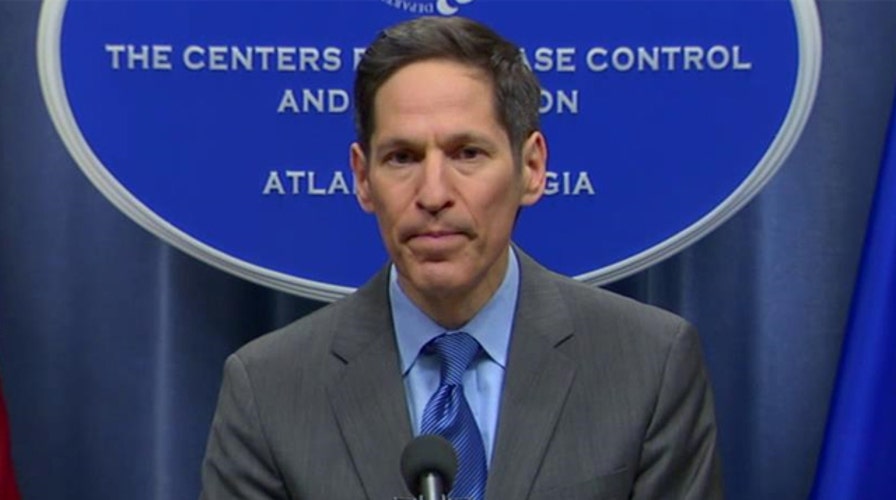CDC Director: Establishing site managers at Ebola stations
CDC holds news conference on response to Ebola cases
Embattled Centers for Disease Control (CDC) director, Dr. Tom Frieden, laid out a new game plan to counter further contamination of health care workers dealing with Ebola patients – including sending rapid response teams to any hospital where a new case is confirmed.
Frieden told reporters during a press conference Tuesday that the CDC had deployed a team of their most experienced staff to Dallas to work with state’s health department and the hospital where Nina Pham, 26, a Texas Health Presbyterian Hospital nurse who cared for Thomas Eric Duncan, is being treated after testing positive for the disease.
Going forward, Frieden said the CDC will provide Ebola response teams within hours of a confirmed case to any hospital in the United States.
"I wish we put team like this [in place] when first the patient was diagnosed," said Frieden. "We will do it from this day forward anywhere in the U.S."
Health care workers have expressed concern for their safety in the wake of Pham's infection.
“Now, I’ve been hearing loud and clear from health care workers around the country that they are worried, don’t feel prepared," said Frieden, who laid out a plan to protect and train medical staff treating potential patients on proper protocol.
Pham became the first person infected by Ebola in the United States while caring for the Liberian for much of his 11 days in Texas Health Presbyterian Hospital. He died on Wednesday.
Going forward, Frieden said the CDC will deploy a response team to any hospital in the country that confirms a case of Ebola, consisting of the world’s leading experts on the disease.
At Texas Presbyterian, the CDC has implemented a site manager to oversee aspects of infection control, including ensuring that personal protective equipment is put on and removed safely and correctly.
“In fact, in our work stopping Ebola in Africa, this is the single most important position to protect health workers: a single site manager who is expert and oversees every aspect of the process,” Frieden said.
The CDC is also limiting the number of health care staff who take care of an infected patient.
Both the CDC and Emory University Hospital confirmed Tuesday that two of the nurses from their Serious Communicable Disease Unit have traveled to Texas to provide consultative support in the use of personal protective equipment and infection control measures while caring for Ebola patients. A nurse clinician who has directly cared for Emory’s Ebola patients and a clinical nurse specialist who wrote Emory Healthcare’s personal protective equipment (PPE) and infection control protocols and is also an experienced safety observer in the isolation unit, will speak with Texas Health employees Tuesday.
“..We hope to provide on the ground standard operating procedures for PPE usage, based on CDC guidelines,” Nancye Feistritzer, RN, DNP, chief nursing officer at Emory University Hospital said in a statement. “We also want to be a resource to other organizations who are facing the need to train direct care providers and to ensure adherence to protocols designed to keep the care team safe.”
Both the CDC and Texas Health Presbyterian Hospital have been widely criticized for their handling of Duncan's case. Frieden assured the public that the agency would implement guidelines for testing at hospitals throughout the U.S.
“[We] want to make sure whatever is done where care is provided, every hospital in country needs to be aware of how to diagnose Ebola,” said Frieden. “Every doctor, nurse, staff person needs to ask where have you been in past month, past 21 days, have you been to Liberia, Sierra Leone or Guinea.”
Frieden acknowledged the CDC's slow response to the first case in Texas and said that the agency could have done more from the beginning.
"...In retrospect, we could have sent a more robust team ... more hands on with the hospital from day one. Getting it right is important [because] the stakes are high," said Frieden. "[The CDC] definitely should have put larger team on ground immediately, and we will do that from now on."
President Obama told defense chiefs from some 20 countries on Tuesday that "the world as a whole is not doing enough" to contain the Ebola threat.
He said the hemorrhagic fever, which has killed almost 4,500 in West Africa, must be stopped at its source.
Obama added that the U.S. health care system is strong enough that an Ebola epidemic in the United States is highly unlikely.
The CDC has not yet identified how Pham became exposed to the virus since she was wearing protective gear that included a gown, gloves, a mask and face shield while she treated Duncan.
But Frieden said that the 26-year-old was cooperating with investigators who are looking closely at protocols to prevent further spread of the virus.
Pham received a transfusion on Monday containing antibodies to fight the virus, according to a Catholic priest from Pham's church. Duncan, did not receive one because he did not match the donor's blood type.
Christian relief group Samaritan's Purse has said that Dr. Kent Brantly, who survived an Ebola infection, donated plasma to Pham.
“I’m doing well and want to thank everyone for their kind wishes and prayers," Pham said Tuesday in a statement released by the hospital. "I am blessed by the support of family and friends."
In a statement Tuesday, Texas Health Presbyterian said the costs for Pham’s care will be covered and not be a financial burden for her or her family.
Pham’s friends have established a fundraising page on GoFundMe, an approved site which will help the family cover other expenses. For those wishing to send a message directly to Pham, the hospital suggested using the “E-mail a patient” function on TexasHealth.org.
Reuters contributed to this report.

